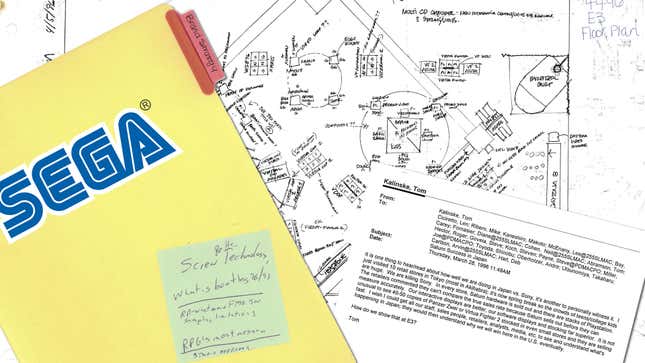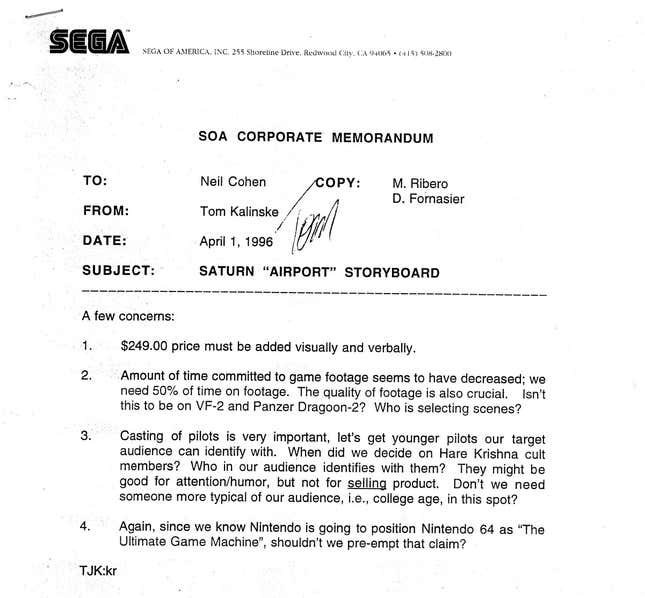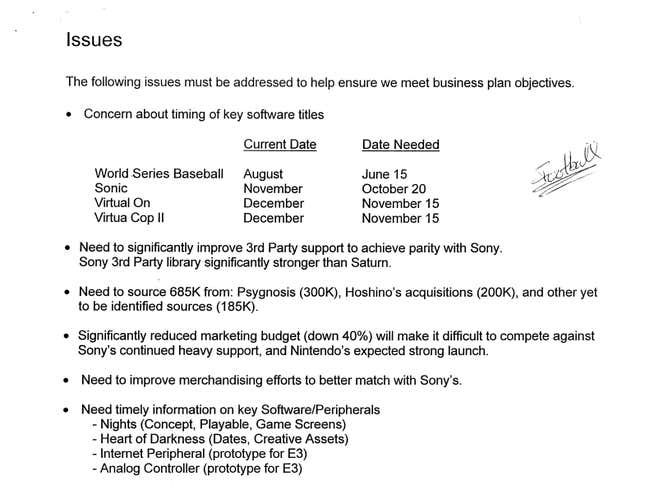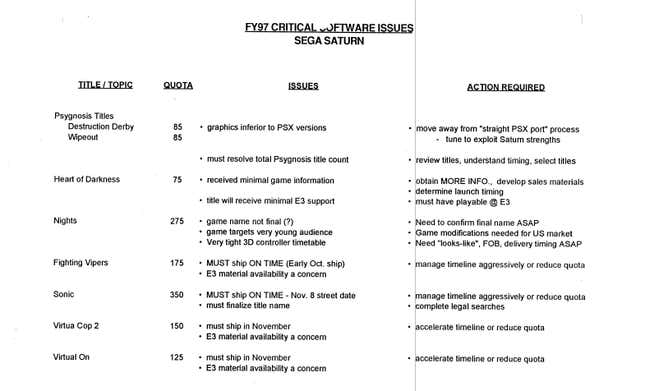
While Microsoft’s FTC case has let the world catch a glimpse behind the scenes at a modern platform holder’s emails, at the same time an enormous treasure trove of old Sega documents from the ‘90s have leaked, and they go a long way to explaining...well, why Sega isn’t a platform holder anymore.
The documents, collected and uploaded to Sega Retro, are a mixed bag of everything from E3 floor plans to financial results. Some of the highlights, though, are internal emails, like this one from March 1996 where former Sega of America CEO Tom Kalinsky writes about the Sega Saturn vs Sony’s PlayStation, a fight that did not end the way it started:
It is one thing to hear/read about how well we are doing in Japan vs. Sony, it’s another to personally witness it. I just visited 10 retail stores in Tokyo (most in Akihabra); it’s now spring break so the crowds of teens/college kids are huge. We are killing Sony. In every store, Saturn hardware is sold out and there are stacks of Playstation. The retailers commented they can’t compare the true sales rate because Saturn sells out before they can measure accurately. Our interactive displays are better, our software displays and stocking far superior. It is not unusual to see 40-50 copies of Panzer Zwei or Virtua Fighter 2 stocked in even small stores and they are selling fast. I wish I could get all our staff, sales people, retailers, analysts, media, etc. to see and understand what’s happening in Japan; they would then understand why we will win here in the U.S. eventually.
How do we show that at E3?
To be fair to Tom, in the earliest days of 1994-95 the Saturn—buoyed by the popularity of Virtua Fighter—did indeed outsell the PlayStation in Japan! That success was only short-lived, however, and by the time Final Fantasy VII dropped in 1997 Sony’s console was out of sight, making Kalinsky’s “We are killing Sony” line one of the most poorly-aged in video game history.
In another document, here’s Kalinsky again, cutting a more forlorn figure in April 1996 as he makes extra clear the Saturn’s new $249 pricepoint—an attempt to undercut Sony’s famous $299 launch price for the PlayStation—while also wondering what the hell is going on with with the “Hare Krishna cult members” in a Saturn TV commercial:

Here’s the commercial, if you’ve never seen it:
Also interesting are a range of marketing strategies for 1997, which give an insight into the kind of battle Sega was facing by that stage of the Saturn’s launch; while some ideas are built on selling the Saturn on its own strengths, like Sega’s first-party games, there’s a lot of stuff that’s just obsessed with Sony’s plans, reacting to Sony’s pricing, trying to pre-empt Sony’s release schedule...it really speaks to a company that by 1997 is playing catch-up in nearly every way possible.

Moving on, here’s a list of Sega’s “critical software issues” facing the Saturn in the 97 financial year, and they are brutally honest, calling out Psygnosis, talking mad shit about (the famously hellish) Heart of Darkness and wondering just how many of these games are going to be ready to show at E3:

If you want to read the full document dump, it’s available here, and aside from the kind of stuff I’ve posted above also includes a range of cereal promotion box art, sales records and even internal emails lamenting how terrible Sega’s sports output had become.
And if reading through any of this has you feeling like Sega was a company in trouble, remember that a lot of these documents are from 1997. Sega would be out of the console business entirely just four years later, in 2001.